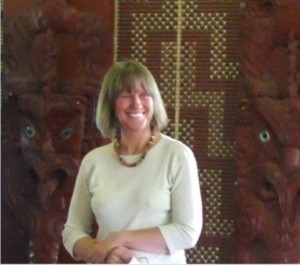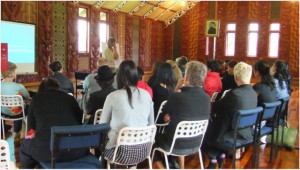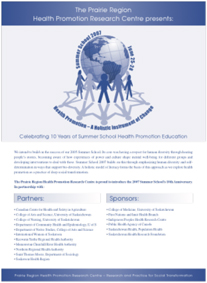
As an educator I aim to draw on people’s multiple ways of knowing the world; to facilitate creative exploration and relationship with our Life-World system in ways that facilitate deep, structural shifts in the basic premises of thought, feelings, and actions (Transformative Learning). I deliberately combine methods that integrate head, heart and hand towards deepened understanding, interconnection and action.
My education work has covered a range of education events – from academic class-room style, to week-long intensive learning forums to community-based workshops and dialogues, and public speaking events. I particularly enjoy co-creating learning events with other educators and have been fortunate to have some wonderful people to work with! Some of my work with KIN (Koru International Network) and the Health Promotion Summer Schools I have run in Saskatchewan, Canada are great examples of these co-created learning events. Below I provide you with a few examples of these.
Topics include:
- Human-environmental relations
- Indigenous and intercultural approaches to ecological well-being
- Health promotion theory and practice
- Applying ecological approaches to public health / health promotion
- Addressing health disparities
- Mental and psycho-spiritual well-being
- Indigenous and migrant health
- Community development
- Community-based research methods including participatory action research
- Socio-cultural and psychotherapeutic approaches to eating issues for women
- Recovery from sexual abuse
I enjoy using a range of methods such as story-telling, ceremony, critical inquiry, psychodrama, socio-drama and forms of arts based inquiry and expression. View my C.V. if you would like to know more about my traditional academic teaching.
2015 Resilient Places – Resilient Peoples: Elders Voices Summit, four day, University-Community Symposium and learning event, Sept 19-22nd, Tsawout Nation, Vancouver Island, B.C., Canada.
Summit Chair and Program Director, responsible for the overall planning, program design and organization of this Community-University learning event, including fundraising and sponsorship. This international, Intercultural, Intergenerational and Intersectoral event was held in the Tsawout Community and served as the foundational gathering for the International Resilience Network. It brought together the University, community, government, social innovation and not for profit sectors from British Columbia, other parts of Canada, America, the U.K., Aotearoa New Zealand and Australia, engaging Indigenous, Settler and recent migrant communities. Attended by over 100 participants the program was deliberately grounded within Indigenous knowledge systems, moving from the theme of Indigenous Knowledge and Resilience, to Holistic approaches to Learning, through to Social Innovation and Resilience. Key partners included the University of Victoria, Canada, University of Southern Queensland, Australia, Koru International Network, Tsawout Nation, Ngai Te Rangi Trust, B.C Association of Aboriginal Friendship Centres, Canada-U.K. Foundation, Ministry of Social Development and Innovation, B.C., and Social Sciences and Humanities Research Council. www.eldersvoicessummit.com
View the Summit Program and Summit Evaluation Report
A selection of KIN Workshops and events, held in Toronto, Canada, Sydney Australia and Auckland, Aotearoa New Zealand; 2010 – present.
These are both sole and co-facilitated and cover a range of events such as formal public talks, workshops, and dialogical events. Below is a small sample list; a full list may be found on www.kinincommon.com
The Radical Human Ecology Dialog Series: Community Converstations across Canada (Toronto, Saskatoon, Edmonton, Victoria). Fall 2012 – Spring 2013
“Human Cultural Diversity for Bio-diversity: The Practice and Theory of Engaging with Living Systems. KIN Associates Training, 18th – 22nd November 2011, Institute for Transpersonal Development, Sydney, Australia. (Attended by Australian KIN Associates).
“There Must be a Better Way! “Conversations on Human Nature and Possibilities for the World”. Public event, (Panel and public dialog) November 24th 2011, Institute for Transpersonal Development, Sydney, Australia. (Attended by Sydney social ecology community and members of the public).
“The Work that Brings Us Home: Part Reconnecting with Indigenous and Intercultural Wisdoms for Ecological well-being”. Workshop for members of the public, November 25-27th, 2011, Institute for Transpersonal Development, Mosman, Sydney.
“We Live in a World that Speaks”. February 4th 2011. Public lecture, Centre for Social Innovation, Toronto. ( Attended by elders, academics, professionals, students and community members).
“From Endangered Peoples to Endangered Worldviews: the Place of Indigenous Being in Restoring Ecological Health”. Public Presentation and workshops held in conjunction with Waitakere City Council at Hoani Waititi Marae, Auckland, New Zealand, May 6th 2010. (Attended by elders, university faculty, students, iwi development and community workers).

Hoani Waititi Marae, Auckland
What participants have said about Lewis:
“I was recently involved in a facilitator training which Lewis designed and led. I, and all there, were supremely impressed by her facilitation skills. She knows when to take her time, when to move on and what individuals in the group most need……..I have rarely seen such skill in facilitation process” (Kathryn McCabe, KIN Associate Australia).
“Dr Lewis Williams’ presentation and the whole event last Friday was so compelling!……..The way she wove this together using the personal, collective, and different stories etc was powerful” (Blake Poland, Associate Professor, University of Toronto).
“Lewis’ authenticity, humility and gentleness and her intuitive, inclusive and respectful facilitation skills created a sacred space where I could connect with the ancient wisdom and deep knowledge of my own indigeneity…….Motivated and inspired after the workshop, I have recently embarked on a Masters of Education in Social Ecology” (Judy Fitzgerald, Director, Journeys for Change, Sydney, Australia).
“Lewis’ story was very helpful in breaking the ice. I think when any facilitator puts themselves in the firing line, it instills participation and confidence” (KIN Workshop participant, Toronto).
“I felt honoured to be in the presence of a presenter who is actually passionate about her subject. Framed by sacred ceremony, Lewis’ case for indigenous ways as a way to address our world’s many social and environmental issues calls us to an awareness of our connection with our home and what it teaches us. Her personal story touched my heart and her research stimulated me to pose questions about what it means to be of a place” (James Wells, Toronto).
Summer Schools, Saskatchewan, Canada.
Whilst Director of the Prairie Region Health Promotion Research Centre, 2003-2009, I was the person responsible overall for running a number of week-long learning events for practitioners from Saskatchewan, Canada and beyond. Evaluations (see below) are available for two of these learning events. These were a lot of fun, as each time the curriculum was co-designed over some ten months by organizational stakeholders and centre partners throughout the Province. These summer schools engaged a range of cultural communities and were great networking as well as learning events! Have a look for yourself……..
 The Human Ecology Learning Series Health in Harmony with the Environment marked a week_long series of dialogues between local Saskatoon based communities, international and local researchers and human ecology practitioners. This was a collaborative effort between a range of partners which included the Reducing Mental Health Disparities Project, the Prairie Region Health Promotion Research Centre, the First Nations and Inuit Health Branch (Health Canada) and the Public Health Agency of Canada. This week consisted of four community dialogue events and an international human ecology retreat. The week had three broad goals:
The Human Ecology Learning Series Health in Harmony with the Environment marked a week_long series of dialogues between local Saskatoon based communities, international and local researchers and human ecology practitioners. This was a collaborative effort between a range of partners which included the Reducing Mental Health Disparities Project, the Prairie Region Health Promotion Research Centre, the First Nations and Inuit Health Branch (Health Canada) and the Public Health Agency of Canada. This week consisted of four community dialogue events and an international human ecology retreat. The week had three broad goals:
- To stimulate thinking and discussion concerning the application of a human ecology paradigm to issues of mental well-being and various cultural communities;
- To explore the potential of creating an international human ecology network; and
- To introduce relevant human ecology concepts and begin to theoretically integrate this approach into the Reducing Mental Health Disparities Project as part of building multi-disciplinary and trans-disciplinary capacity in the area.
This week was attended by international human ecology practitioners and scholars from Aotearoa New Zealand, Scotland, Brazil and Uganda as well as locally based people from a range of cultural groups which included Aboriginal and migrant communities. Community dialogue events were based on the application of human ecology as relevant to well-being issues for these communities.
View the Report on Health in harmony with the environment: Human Ecology Week learning series, 2008.
Summer School 2007 “Health Promotion: A Holistic Instrument of Change”, Saskatoon June 25-28th
 The theme, Health Promotion: A Holistic Instrument of Change, was chosen to introduce an expanded concept of literacy in all its facets. An Indigenous approach to literacy and well-being was adopted which includes human-environmental relations. Attended by 128 participants from throughout Saskatchewan, Canada and from overseas, the Summer School was designed to help participants gain an understanding of several broad learning objectives:
The theme, Health Promotion: A Holistic Instrument of Change, was chosen to introduce an expanded concept of literacy in all its facets. An Indigenous approach to literacy and well-being was adopted which includes human-environmental relations. Attended by 128 participants from throughout Saskatchewan, Canada and from overseas, the Summer School was designed to help participants gain an understanding of several broad learning objectives:
- A holistic approach to population health promotion;
- Global and local influences on health outcomes;
- How economic, cultural, and power inequities affect health in diverse settings, with a specific focus on Aboriginal, immigrant, and refugee populations;
- The relationship between personal and social transformation at the practitioner and community levels;
- Intervention methods including storytelling, ritual, critical dialog and inquiry, community development, arts-informed research and development methodologies, participatory research and needs assessment, restorative justice and healing, coalition building, and public policy advocacy; and
- Skills in intervention development, including how to frame issues and use evidence-based approaches, program planning and evaluation
View the Evaluation of the 2007 Summer School “Health Promotion: A Holistic Instrument of Change”
What Summer School Participants had to say:
“I took a great deal away from this session; it was personally rewarding and gave me an opportunity to self-reflect on my own journey of transformation” (Response to Lewis Williams’ keynote)
“The topics were very unique and really challenged our definitions of health promotion. I think that risk the group took was so fabulous. It really enriched my life experience”.
“Speakers – wonderful variety and caliber of speakers. New perspectives on literacy and transformation. . . .”
“The topics and plenaries were great. I also liked the breakout sessions – good, timely topics. . . . I really liked how Aboriginal issues were . . . tied into the panels, topics, etc.”.
“Dr Williams has consistently demonstrated strong leadership skills with the ability to communicate extremely well and work positively alongside a diverse range of people working in different areas of health promotion. The academic, health and broader community have definitely benefited from her professional practice”(Linda Spice, Provincial Manager, Saskatchewan, Public Health Agency of Canada).
“Summer School 2005 “Taking a Population Health Approach to Mental Health: Identity, Culture and Power”
Attended by 185 from throughout Saskatchewan, Canada and abroad, Summer School 2005 had two broad overarching goals:
- To strengthen community and organizational capacity to develop arrange of effective health promotion initiatives in addressing underlying health determinants of mental health and well-being, and
- To enable the creation of health-related policies and programs which support the self-determination of a variety of cultural communities.
With these broad goals in mind, the program was then tailored specifically around the theme of “identity, culture and power”. This theme was largely chosen by the Summer School Organizing Committee based on the evidence that mental well-being is unevenly distributed across populations and that those groups who experience mental health disparities are those at the economic and cultural margins of societies.
What Summer School participants had to say:
“Very informative and inclusive. I appreciate the wide spectrum of identity (ies) Dr. Williams addressed….Excellent start to conference.”
“Wonderful experience; very thought provoking…Thank you for choosing this theme & bringing exciting, dynamic speakers and participants together to learn/exchange ideas”
“I found through this summer school my legs to stand on again. I felt I was floundering a lot at work but now I know my way of thinking is okay. I know what to do to handle day to day events”
